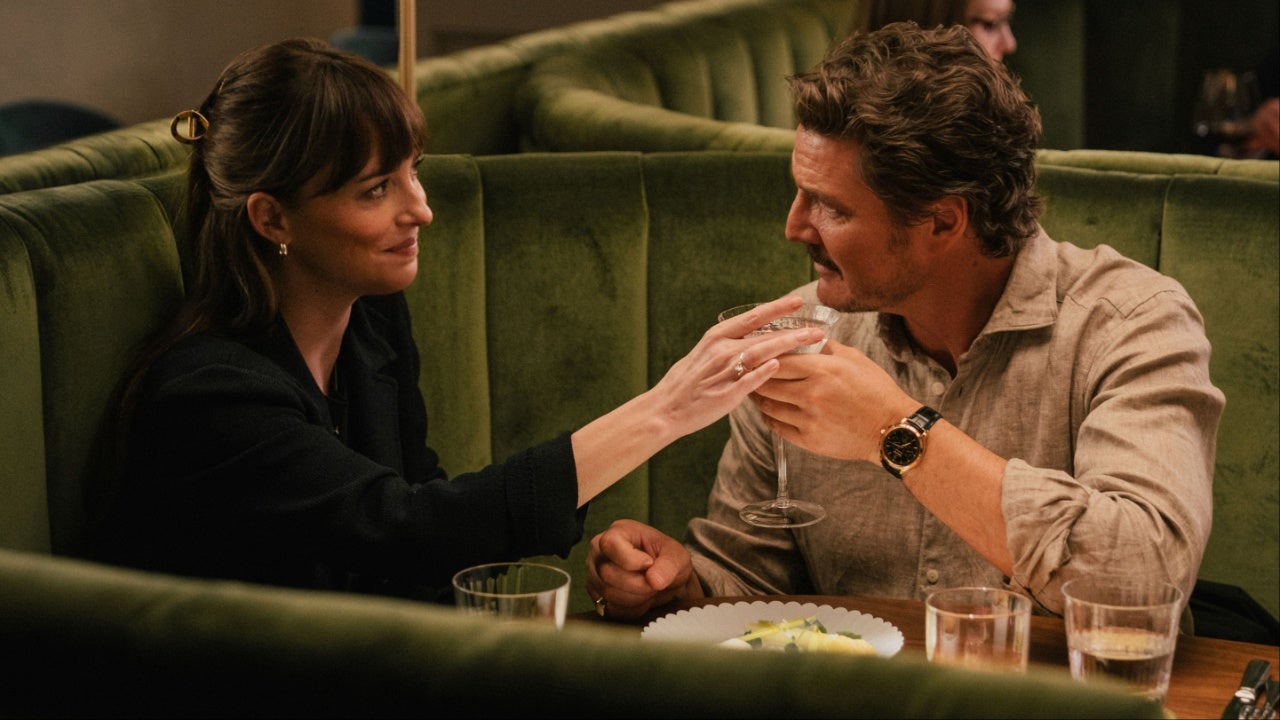
Materialists opens in theaters Friday, June 13.
Celine Song’s follow-up to her Best Picture nominee Past Lives is a Trojan horse. From a distance, the movie’s plot resembles the type of fun, quirky, often disposable romantic comedy that filled theaters and video-store shelves in the 2000s, in which a professional woman, single by choice, is challenged by unexpected notions of love. Song, however, plays with these familiar tropes as well as the expected “types” of stars Dakota Johnson, Chris Evans, and Pedro Pascal, in order to pull the rug out from under her audience. Beneath an inviting surface lie heavy themes of loneliness and self-loathing, and some of the most cynical characters this side of Lars von Trier. Johnson, Evans, and Pascal play people who find uncomfortable ways to face and overcome their most misanthropic leanings in a world of zeros and ones, expensive matchmakers, and the financial expectations of dating in your 30s and 40s. The result is as jagged as it is soothing: a love triangle that starts out withheld and austere, before gradually deepening.
The movie begins in wildly unexpected fashion, with a saccharine prehistoric scene of a cave-dwelling couple that hints toward the movie’s poetic promise. The engagement ring they share, made from a pristine white daisy, is immediately contrasted with the glistening trinkets in the modern Manhattan apartment of matchmaker Lucy Macarro (Johnson). In keeping with Lucy’s character: the sentimental becomes material. As she walks to the office, Lucy hands out flashy business cards to any single men who catch her eye – or whose eye she catches, turning their advances into a business opportunity.
At work, she and her colleagues update one another on the progress of various single (or once single) clients, whom they refer to as “Charlotte B,” “Peter C,” “Mark P,” and so on. This speaks to the relative anonymity their services offer, though it becomes clear when Lucy sits down with a client who’s also something of a friend – the eager but perpetually single “Sophie L” (Zoë Winters) – that people are little more than data points to her. “Five-eleven.” “Six figures a year.” “Fit.” “Balding.” She speaks about marriage and romance as transactions that increase people’s value and add to their security, as though she were some combination of a dating app and an investment portfolio given human form. However, when Lucy attends a wedding she helped make happen, that stern, professional façade is put to the test – first by the groom’s brother and best man, handsome doctor Harry (Pascal), and then by one of the waiters working the event, down-on-his luck actor – and Lucy’s ex-boyfriend – John (Evans).
This eccentric love triangle hinges on some unexpectedly poignant performances. Song uses Johnson’s generally icy demeanor to tremendous effect: as a flimsy wall whose cracks betray a wariness and selfishness. Brief flashbacks to her tumultuous relationship with John – as a pair of wannabe Broadway performers raised in poverty – hint at the superficial reasons she left him many years ago, in the hopes of a more luxurious lifestyle. The breakup has long worn on John as well, affording Evans the chance to play a rom-com lead whose charisma is sanded down by the sheer exhaustion of the acting grind. It’s a pivotal ballast, preventing his flowery, hopelessly romantic declarations from floating off into oblivion, to be forgotten among so many other movies’ wannabe “you complete me”s.
As Lucy’s gilded, tender new alternative Harry, Pascal’s withdrawn charm creates an air of mystery that works wonders on multiple fronts. He’s just as guarded as Lucy, and just as materialistic (hey, like the title!), but they vibrate at the exact same romantic wavelength. She’s immediately taken by what are, essentially, business proposals in the form of fancy dates and nights spent at his eight-figure Tribeca penthouse – a space introduced to us during mischievous love making scenes where Johnson’s eyes keep drifting in awe towards the high ceilings. (Quite the contrast to the ramshackle, three-bedroom walkup shared by John and his off-putting roommates.) She wants more, and more, and more, and Materialists never lambasts her for it. Song fully understands the allure of the finer things and the classically Hollywood escapism of onscreen luxury.
Lucy’s eventual dilemma isn’t so much about choosing a life of opulence with Harry or a life of struggle with John but rather, about what each man represents for her. Harry is a perfect match on paper. Her relationship with John has proven messy in the past. But before long, the question becomes about which of them truly knows her, and is willing to help see herself in ways she no longer can after cocooning herself off from the possibility of love.
Song approaches both paths with a deft cinematic hand. Whether they’re chatting or smoking in silence, the space between Lucy and her suitors always feels electrified – albeit at different voltages for each man. The exorbitant dates Harry takes her on have the warm glow of something comforting, and valuable. In bed together, they tangle in satin sheets, shot as if in a pristine, perfectly-planned perfume commercial, accompanied by Daniel Pemberton’s lightly melodic score. Meanwhile, nearly every scene involving the rough-and-tumble John involves a roving camera and the harsh sounds of New York City. His presence feels more improvised compared to the classically composed steeliness of Harry’s.
But it isn’t just these dueling notions of romance that force Lucy to look within. The movie takes some somber left turns courtesy of Winters’ magnificently modulated performance as the self-effacing Sophie, who becomes the center of some surprisingly difficult scenes, both about her transactional friendship with Lucy, and about the underlying dangers of the blind dates pushed her way. Although not always smoothly blended with Materialists’ love triangle, this subplot ends up a necessary reflection of the worst parts of Lucy’s career and her algorithmic approach to other people.
Materialists as a whole feels intentionally caught in this very same tug-of-war. It takes an open-hearted approach to even the most pessimistic attempts at dating, by people who think they might not deserve love, or who feel like they’ve reached an age where time is running out. So, they choose to settle for numbers and checked boxes in lieu of real connections. But behind every corner lies demanding, even uncomfortable possibility, which Lucy discovers as she goes through the motions of the traditional rom com – and then gets yanked past them. Song confronts her lead character with tough questions about her worth as a person when so much of what she does and says has unpleasant ripple effects for other people’s romantic journeys. The answers are, refreshingly, not so simple, yielding a romantic drama that rests heavy on your heart for lengthy stretches, without ever letting up.












